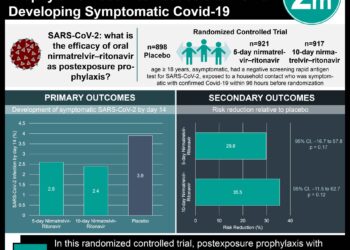Risk factors associated with acute respiratory distress syndrome in COVID-19 patients
1. Study findings suggest that risk factors predisposing patients to progression to acute respiratory distress syndrome (ARDS) include older age, neutrophilia, and organ and coagulation dysfunction.
2. Some factors, including high fever, were associated with higher rates of ARDS development but lower rates of mortality.
3. In this observational study with small sample size and potential selection bias, methylprednisolone treatment may have been associated with lower mortality rates patients in COVID-19 patients with ARDS.
Evidence Rating: 3 (Average)
Development of hypoxemia and progression to acute respiratory distress syndrome (ARDS) is a mechanism is a cause of morbidity and mortality in COVID-19 patients. In this retrospective cohort study, the data of 201 patients aged 21 to 83 with confirmed COVID-19 pneumonia hospitalized in Wuhan China was analyzed to delineate risk factors associated with development of ARDS and progression from ARDS to death. Eighty-four patients (41.8%) developed ARDS and 44 of these patients (52.4%) died. Patients who developed ARDS were more likely to present with dyspnea (59.5% versus 25.6%) and pre-existing comorbidities such as hypertension (27.4% versus 13.7%), diabetes (19.0% versus 5.1%) versus patients that did not develop ARDS. Risk factors identified as being associated with development of ARDS and progression from ARDS to death include age over 65 years (hazard ratio [HR], 3.26, 6.17, respectively), neutrophilia (HR 1.14, 1.08, respectively), elevated end-organ related and coagulation indices, with LDH and D-dimer specifically being mentioned. High fever of over 39°C was associated with higher likelihood of ARDS development (HR, 1.77) but lower likelihood of death (HR, 0.41) and overall associated with better outcomes. Likewise, several other factors such as pre-existing comorbidities, lymphocyte counts, glucose, creatinine, and other markers, were associated with the development of ARDS but not progression from ARDS to death, indicating the possibility for different pathophysiological mechanisms underlying the outcomes. Finally, although this was not the primary focus for the investigation, it was found that patients with ARDS who received methylprednisolone treatment had lower rates of mortality that those who did not (46% versus 61.8%). This study findings provide important information regarding factors linked with ARDS in COVID-19 patients, and direction for further investigation into treatment regimens.
Click to read the study in JAMA Internal Medicine
Image: PD
©2020 2 Minute Medicine, Inc. All rights reserved. No works may be reproduced without expressed written consent from 2 Minute Medicine, Inc. Inquire about licensing here. No article should be construed as medical advice and is not intended as such by the authors or by 2 Minute Medicine, Inc.







